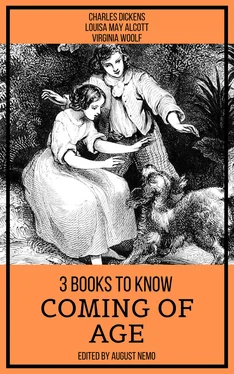It was a very dark night when it was all over, and when I set out with Mr. Wopsle on the walk home. Beyond town, we found a heavy mist out, and it fell wet and thick. The turnpike lamp was a blur, quite out of the lamp's usual place apparently, and its rays looked solid substance on the fog. We were noticing this, and saying how that the mist rose with a change of wind from a certain quarter of our marshes, when we came upon a man, slouching under the lee of the turnpike house.
"Halloa!" we said, stopping. "Orlick, there?"
"Ah!" he answered, slouching out. "I was standing by, a minute, on the chance of company."
"You are late," I remarked.
Orlick not unnaturally answered, "Well? And you're late."
"We have been," said Mr. Wopsle, exalted with his late performance, "we have been indulging, Mr. Orlick, in an intellectual evening."
Old Orlick growled, as if he had nothing to say about that, and we all went on together. I asked him presently whether he had been spending his half-holiday up and down town?
"Yes," said he, "all of it. I come in behind yourself. I didn't see you, but I must have been pretty close behind you. By-the-bye, the guns is going again."
"At the Hulks?" said I.
"Ay! There's some of the birds flown from the cages. The guns have been going since dark, about. You'll hear one presently."
In effect, we had not walked many yards further, when the wellremembered boom came towards us, deadened by the mist, and heavily rolled away along the low grounds by the river, as if it were pursuing and threatening the fugitives.
"A good night for cutting off in," said Orlick. "We'd be puzzled how to bring down a jail-bird on the wing, to-night."
The subject was a suggestive one to me, and I thought about it in silence. Mr. Wopsle, as the ill-requited uncle of the evening's tragedy, fell to meditating aloud in his garden at Camberwell. Orlick, with his hands in his pockets, slouched heavily at my side. It was very dark, very wet, very muddy, and so we splashed along. Now and then, the sound of the signal cannon broke upon us again, and again rolled sulkily along the course of the river. I kept myself to myself and my thoughts. Mr. Wopsle died amiably at Camberwell, and exceedingly game on Bosworth Field, and in the greatest agonies at Glastonbury. Orlick sometimes growled, "Beat it out, beat it out—Old Clem! With a clink for the stout—Old Clem!" I thought he had been drinking, but he was not drunk.
Thus, we came to the village. The way by which we approached it, took us past the Three Jolly Bargemen, which we were surprised to find—it being eleven o'clock—in a state of commotion, with the door wide open, and unwonted lights that had been hastily caught up and put down, scattered about. Mr. Wopsle dropped in to ask what was the matter (surmising that a convict had been taken), but came running out in a great hurry.
"There's something wrong," said he, without stopping, "up at your place, Pip. Run all!"
"What is it?" I asked, keeping up with him. So did Orlick, at my side.
"I can't quite understand. The house seems to have been violently entered when Joe Gargery was out. Supposed by convicts. Somebody has been attacked and hurt."
We were running too fast to admit of more being said, and we made no stop until we got into our kitchen. It was full of people; the whole village was there, or in the yard; and there was a surgeon, and there was Joe, and there was a group of women, all on the floor in the midst of the kitchen. The unemployed bystanders drew back when they saw me, and so I became aware of my sister—lying without sense or movement on the bare boards where she had been knocked down by a tremendous blow on the back of the head, dealt by some unknown hand when her face was turned towards the fire—destined never to be on the Rampage again, while she was the wife of Joe.
With my head full of George Barnwell, I was at first disposed to believe that I must have had some hand in the attack upon my sister, or at all events that as her near relation, popularly known to be under obligations to her, I was a more legitimate object of suspicion than any one else. But when, in the clearer light of next morning, I began to reconsider the matter and to hear it discussed around me on all sides, I took another view of the case, which was more reasonable.
Joe had been at the Three Jolly Bargemen, smoking his pipe, from a quarter after eight o'clock to a quarter before ten. While he was there, my sister had been seen standing at the kitchen door, and had exchanged Good Night with a farm-labourer going home. The man could not be more particular as to the time at which he saw her (he got into dense confusion when he tried to be), than that it must have been before nine. When Joe went home at five minutes before ten, he found her struck down on the floor, and promptly called in assistance. The fire had not then burnt unusually low, nor was the snuff of the candle very long; the candle, however, had been blown out.
Nothing had been taken away from any part of the house. Neither, beyond the blowing out of the candle—which stood on a table between the door and my sister, and was behind her when she stood facing the fire and was struck—was there any disarrangement of the kitchen, excepting such as she herself had made, in falling and bleeding. But, there was one remarkable piece of evidence on the spot. She had been struck with something blunt and heavy, on the head and spine; after the blows were dealt, something heavy had been thrown down at her with considerable violence, as she lay on her face. And on the ground beside her, when Joe picked her up, was a convict's leg-iron which had been filed asunder.
Now, Joe, examining this iron with a smith's eye, declared it to have been filed asunder some time ago. The hue and cry going off to the Hulks, and people coming thence to examine the iron, Joe's opinion was corroborated. They did not undertake to say when it had left the prison-ships to which it undoubtedly had once belonged; but they claimed to know for certain that that particular manacle had not been worn by either of the two convicts who had escaped last night. Further, one of those two was already re-taken, and had not freed himself of his iron.
Knowing what I knew, I set up an inference of my own here. I believed the iron to be my convict's iron—the iron I had seen and heard him filing at, on the marshes—but my mind did not accuse him of having put it to its latest use. For, I believed one of two other persons to have become possessed of it, and to have turned it to this cruel account. Either Orlick, or the strange man who had shown me the file.
Now, as to Orlick; he had gone to town exactly as he told us when we picked him up at the turnpike, he had been seen about town all the evening, he had been in divers companies in several public-houses, and he had come back with myself and Mr. Wopsle. There was nothing against him, save the quarrel; and my sister had quarrelled with him, and with everybody else about her, ten thousand times. As to the strange man; if he had come back for his two bank-notes there could have been no dispute about them, because my sister was fully prepared to restore them. Besides, there had been no altercation; the assailant had come in so silently and suddenly, that she had been felled before she could look round.
It was horrible to think that I had provided the weapon, however undesignedly, but I could hardly think otherwise. I suffered unspeakable trouble while I considered and reconsidered whether I should at last dissolve that spell of my childhood, and tell Joe all the story. For months afterwards, I every day settled the question finally in the negative, and reopened and reargued it next morning. The contention came, after all, to this;—the secret was such an old one now, had so grown into me and become a part of myself, that I could not tear it away. In addition to the dread that, having led up to so much mischief, it would be now more likely than ever to alienate Joe from me if he believed it, I had a further restraining dread that he would not believe it, but would assort it with the fabulous dogs and veal-cutlets as a monstrous invention. However, I temporized with myself, of course—for, was I not wavering between right and wrong, when the thing is always done?—and resolved to make a full disclosure if I should see any such new occasion as a new chance of helping in the discovery of the assailant.
Читать дальше












